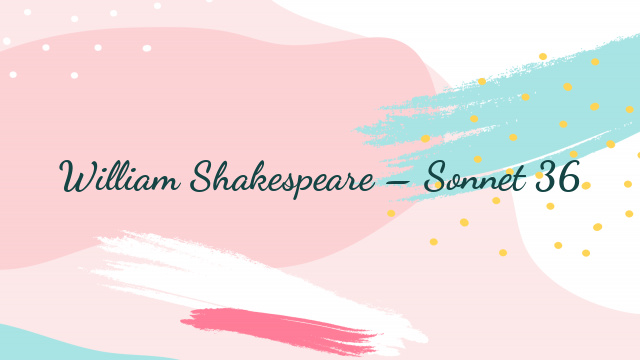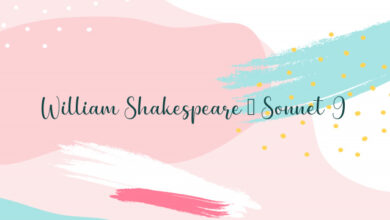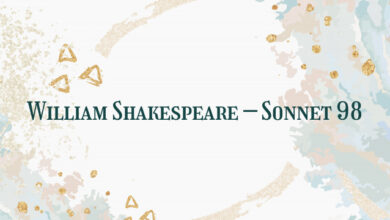
William Shakespeare – Sonnet 36
Let me confess that we two must be twain,
Although our undivided loves are one:
So shall those blots that do with me remain,
Without thy help, by me be borne alone.
In our two loves there is but one respect,
Though in our lives a separable spite,
Which though it alter not love’s sole effect,
Yet doth it steal sweet hours from love’s delight.
I may not evermore acknowledge thee,
Lest my bewailed guilt should do thee shame,
Nor thou with public kindness honour me,
Unless thou take that honour from thy name:
But do not so, I love thee in such sort,
As thou being mine, mine is thy good report.
This is one of the separation sonnets, which acts as an end stop for the previous three, and links in with 39, with which it shares many of its ideas. It conveys in brief the wrenching brutality of a divorce and the pain of the resolution that must be taken to bear it. The self denial of the poet and his willingness to sacrifice his own pleasure for the sake of his beloved is all too apparent, and it is not difficult to detect a note of additional pain caused by the perceived injustice. (See notes).
However it is possible to take an alternative reading of the entire sonnet, namely that it is the youth’s own apologia, although written by the poet in the persona of thy advocate, which he declares himself to be in the previous sonnet. In that way the blots and disgraces remain with the youth, in their original habitation, rather than being transferred to the poet by the over sophisticated arguments of 35. For it is not at all evident how the stain of the sensual fault, whatever that fault was, should suddenly become the lover’s rather than the youth’s. It is true that then the difficulty arises of explaining the reciprocity of public kindness and honour, since in the past it has been assumed to be entirely one way, from the young nobleman to the poet. Now we posit the possibility that the presentation and circulation of a poem in praise of the young man may be construed as an honour. Indeed, why not? For we know that dedications of poems to noblemen as patrons was normal, and we have no reason to doubt that the aristocrats of the time welcomed such attentions and felt honoured by them, despite the fecund humility of many of the recorded dedicatory addresses.
Such an interpretation in any case need not negate the traditional one, but may quite easily stand alongside it, adding a further layer of complexity to the troubled relationship. It also adds piquancy to the closing couplet, which occurs again in Sonn.96, as if the poet were remarking ironically that the lines spoken now by the beloved youth could be used again in another context and at another time of separation.
The 1609 Quarto Version
LEt me confeſſe that we two muſt be twaine,
Although our vndeuided loues are one:
So ſhall thoſe blots that do with me remaine,
Without thy helpe, by me be borne alone.
In our two loues there is but one reſpect,
Though in our liues a ſeperable ſpight,
Which though it alter not loues ſole effect,
Yet doth it ſteal ſweete houres from loues delight,
I may not euer-more acknowledge thee,
Leaſt my bewailed guilt ſhould do thee ſhame,
Nor thou with publike kindneſſe honour me,
Vnleſſe thou take that honour from thy name:
But doe not ſo,I loue thee in ſuch ſort,
As thou being mine,mine is thy good report.
Commentary
1. Let me confess that we two must be twain,Let me confess = I acknowledge the fact that. There is an echo here from the confessional of the words spoken before admitting one’s sins. Confiteor Deo omnipotenti I confess to almighty God. Also probably a glance forward to the opening of Sonn.116:
Let me not to the marriage of true minds
Admit impediments.
twain = separated, as two separate individuals. But there must also be the residual meaning of ‘a couple’, as in to bless this twain, that they may prosperous be. Temp.IV.1.104. So that the overt meaning of divorce has a strong undercurrent of its opposite undermining it, caused by the echoes, suggestions and remembrances of fidelity, ‘let me confess that we two are eternally inseparable’.2. Although our undivided loves are one:SB (p.192) points out that this whole sonnet is underpinned by the Pauline teaching on marriage, Eph.5.25-33. Love unites two people and makes them one.3. So shall those blots that do with me remain,If we take this sonnet as the youth’s apologia, then thoseblots are the same as the stains, disgraces and ill deeds alluded to in 33-35. Otherwise we may take it that the poet attaches to himself some of the youth’s guilt, that guilt being inseparable from himself; or that the social divide which casts him beyond the pale and is referred to in Sonns.87, 110, 111, and perhaps in this tetrad (33-36) remains as a stain upon his person.4. Without thy help, by me be borne alone.HV (p.193) detects here a sense of rankling injustice. SB (p.193) reminds us that the use of borne is suggestive of a pregnant girl being abandoned to bear her child without help and in utter misery. Alternatively, if the youth is taken to be the speaker, there could be a sense of defiance and even triumph – ‘I can bear this on my own; I do not need your help’.5. In our two loves there is but one respect,one respect = one aim, one concern, a singleness of thought. But with a suggestion that the youth is (selfishly) obliged to take care of (have respect for) his reputation and prospects.6. Though in our lives a separable spite,
a separable spite = an evil fate which separates us; a separation which vexes us. Spite has the meaning of something malignant which operates to one’s detriment. Cf.
The time is out of joint. O cursed spite,
That ever I was born to set it right. Ham.I.5.189-90.
O spite! too old to be engaged to young. MND.I.1.138.
Also in the Sonnets:
So I, made lame by Fortune’s dearest spite, 37
Kill me with spites yet we must not be foes. 40
Join with the spite of fortune, make me bow, 90
When other petty griefs have done their spite, 907. Which though it alter not love’s sole effect,it = the separable spite in l.6 above. love’s sole effect = the essential nature of love. Audibly one could take it as ‘the effect of love on one’s soul’.8. Yet doth it steal sweet hours from love’s delight.
it = the separable spite. sweet hours from love’s delight = the sweet hours that we would otherwise spend together.9. I may not evermore acknowledge thee,I may not evermore = I am restricted constantly, continually (the usual meaning of evermore in Shakespeare), so that I am unable to etc. Cf. That she reserves it evermore about her / To kiss and talk to. OTH.III.3.299-300. And its two other uses in the Sonnets:
Yet this thy praise cannot be so thy praise,
To tie up envy evermore enlarged 70;
And
Past cure I am, now Reason is past care,
And frantic-mad with evermore unrest; 147.
Although here it does seem to have more of its modern meaning of ‘for all time, for eternity’.10. Lest my bewailed guilt should do thee shame,bewailed guilt = guilt which has been wept for, repented of. This seems to recall Ah! but those tears are pearl which thy love sheds of the previous sonnet. It could shame the poet by drawing attention to the fault and to the disgrace thereof, and perhaps also because tears were unmanly.11. Nor thou with public kindness honour me,See the introductory note above. The honour could be from poet to patron, or from noble youth to socially inferior (and besotted) admirer.12. Unless thou take that honour from thy name:By honouring me you subtract honour from yourself. (This can apply to either the poet or the youth).13. But do not so, I love thee in such sort,The final couplet is used again in Sonn.96. See the Introductory note above for a possible explanation.
In such sort = so much, in such a way, with such intensity.14. As thou being mine, mine is thy good report.As thou being mine – Cf. l.2: because their undivided loves are one. mine is thy good report = your good reputation is as much yours as it is mine, it affects us equally, (and thus I must ensure that it is not damaged by my waywardness).




